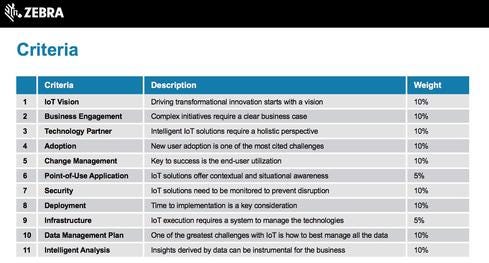Is Your Company Smart Enough to Succeed?
Determining if your organization is an intelligent enterprise or a slow learner may be challenging, but a new index quantifies criteria in terms of data usage, workflow efficiency, and progress toward the IoT.

Human intelligence can be measured with some success via standardized tests, but assessing company intelligence isn't so easy. Seeking a method that could help companies assess their internal smarts, Zebra Technologies recently set out to create a survey that measures company intelligence.
According to Zebra, the Internet of Things (IoT), mobility, and cloud computing have converged into a new operational model it calls the Intelligent Enterprise. The Intelligent Enterprise Index measures to what extent companies today are meeting the criteria that define today’s intelligent enterprise and published the results of a global survey for the first time this month.
Criteria that lead to an intelligent enterprise include a company's IoT vision and adoption strategy, as well as the steps it takes to create a return on its IoT investment. The criteria were identified by leading executives, industry experts and policymakers across different industries late last year at the 2016 Strategic Innovation Symposium: The Intelligent Enterprise, which was hosted by Zebra in collaboration with the Technology and Entrepreneurship Center at Harvard (TECH).
Leveraging operational data
Enterprise intelligence grows when an organization leverages operational data to drive actionable insights and workflow improvements, according to Chip Yager, Zebra's vice president of strategy. "Knowing where employees are, the availability of equipment and the condition of goods can all help inform operational tasks, making operations more efficient, lowering costs and improving customer service," he said. "The Intelligent Enterprise Index is an assessment of where companies are on their journey and how fast they are moving toward an end-to-end solution."
Yager noted that having a solid knowledge and understanding of the IoT plays a key role in fostering company intelligence. "The most advanced companies in our survey have a clear vision of their IoT future, an understanding of the RoI, and are investing to make it happen," he said. "These companies invest in the technology that drives their front-line operations, which in turn enables both new data insights and advanced applications that guide users to the 'next best action.'"

For many companies, big data analytics -- essential for deriving actionable intelligence from transactional data -- is necessary for building company intelligence. Yet that's only part of the picture, Yager said. "While there are plenty of insights that can be gained here, [one] can overlook the opportunities to leverage real-time operational data," he noted.
Retailers, for example, understand that tracking sales and inventory is necessary to improve planning. Yet knowing in real time when a shelf is empty and directing a worker to restock creates an immediate and significant financial impact. "The most progressive companies ... look at their opportunity costs and workflow inefficiencies and consider how they could improve these by leveraging real-time data," Yager said.
Working with companies that are already on the forefront of enterprise asset intelligence is the fastest way for an organization to bolster its own intelligence. "Companies need a clear vision. Once that is in place, the right partners can help create the plan that makes it reality," Yager said.
Lagging behind
According to the survey, nearly 50% of companies leave half of their intelligence on the table. Only 5%, the study found, can be considered truly "intelligent," meaning they are leveraging ties between the physical and digital worlds for better visibility and actionable insights.
In today’s fast-moving technology world, companies that are tech laggards can suffer competitively. The Intelligent Enterprise Index points to companies that are investing early and pursuing IoT solutions most aggressively. "These same companies are likely to see competitive advantages in the marketplace," Yager noted.
Executives and managers can assess their own company's intelligence level by completing a six-question online assessment.
About the Author
You May Also Like




